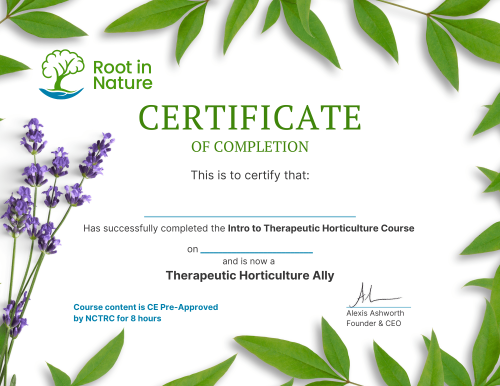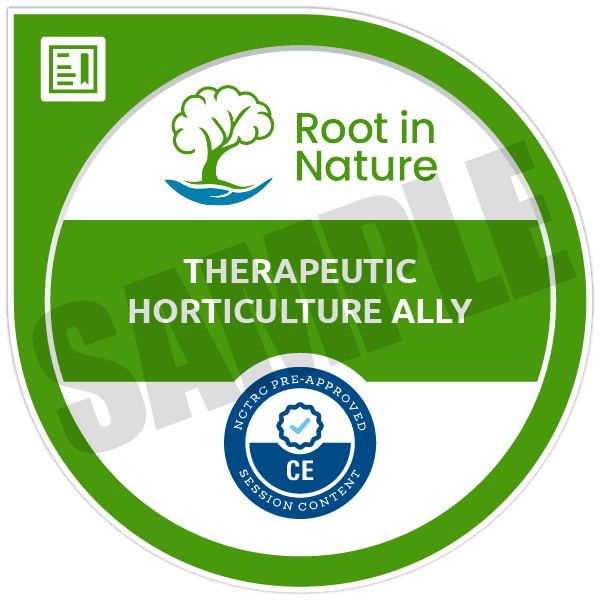Therapeutic Horticulture Training for Students
Empowering Through Partnership
Equip your students with an innovative suite of therapeutic horticulture skills
Root in Nature collaborates closely with universities and colleges to elevate their therapeutic recreation programs. We offer students foundational training in therapeutic horticulture, leveraging industry-leading practices to equip them for success in their careers.


How it Works
The Intro to Therapeutic Horticulture course is accessible via our Learning Management System (LMS) and culminates in the awarding of a Therapeutic Horticulture Ally Certificate and digital badge.
This micro-credential empowers students with the confidence to lead therapeutic horticulture activities professionally. Upon successful completion, Root in Nature directly issues the certificate to students.
This four-hour, self-paced, virtual course is ideal for semester integration, offering the versatility to be assigned as independent coursework.
How We Equip Your Students

Provide training in therapeutic horticulture through our virtual, self-paced course

Teach students how to connect people with plants and nature indoors or outdoors

Provide a Therapeutic Horticulture Ally certificate and digital badge to add to their resume

If desired, provide ongoing resources, activities & support
Program Details
Training Through the Intro to Therapeutic Horticulture Course
This virtual, self-paced course teaches how to facilitate, adapt and evaluate therapeutic horticulture sessions while providing foundational horticulture and safety training. Students will finish this course with the skills to facilitate activities with individual clients and small groups.


Course Details
- CE Credits with NCTRC for 8 hours
- Completed in 4 -8 hours
- Primarily video content
- 5 Modules & Quizzes
- 63 Topics
- Course Manual
- Therapeutic Horticulture Ally Certificate
- Digital Badge
Optional Continuation for Students: The GrowTH Network
GrowTH – Grow Therapeutic Horticulture is professional growth and resource platform for therapeutic horticulture practitioners and course graduates. This is an international and interdisciplinary space for those practicing therapeutic horticulture.


Resources & Support
- 12 Session Plans
- Sortable Activity Database with 150+ step-by-step activities
- Expert-led monthly support calls
- Free ongoing professional development events
- A Resource Library, including:
- Intake & Evaluation Forms
- Visual cues
- Sensory Plant Lists
- Assessment form templates
Feedback from Course Students
Benefits for Educational Institutions
Enhanced Curriculum Appeal
Incorporating industry-leading therapeutic horticulture training into the curriculum can attract prospective students interested in cutting-edge therapeutic practices, distinguishing the program from competitors.
Increased Enrollment
Offering specialized training like therapeutic horticulture can draw more students to the program, interested in acquiring unique and employable skills.
Improved Employment Outcomes for Graduates
Equipping students with a specialized skill set in therapeutic horticulture prepares them for a broader range of employment opportunities post-graduation, enhancing the program’s reputation for successful job placements.
Partnership and Networking Opportunities
Collaborating with Root in Nature for therapeutic horticulture training opens up avenues for networking with professionals and organizations in the field, potentially leading to guest lectures, internships, and job placements for students.
Innovative Teaching Methods
Integrating therapeutic horticulture into the curriculum introduces students to innovative and practical teaching methods, providing hands-on learning experiences that are likely to enhance student engagement and retention of material.
Leadership in Educational Trends
Adopting therapeutic horticulture training positions the institution as a leader in recreational therapy education, keeping pace with or even setting new trends in therapeutic practices.
Positive Impact on Student Wellness
Offering therapeutic horticulture as part of the curriculum not only educates students but can also positively affect their mental and emotional well-being, promoting a healthier learning environment.
Community Engagement Opportunities
Therapeutic horticulture projects can serve as a bridge to the wider community, offering students real-world experience while also contributing positively to local communities through service learning projects.
Research and Development
Incorporating therapeutic horticulture opens new avenues for research in recreational therapy, allowing faculty and students to explore and contribute to the growing body of knowledge in this field.
Strengthened Alumni Network
Graduates with unique skills in therapeutic horticulture may achieve notable success in their careers, strengthening the institution’s alumni network and contributing to its prestige.
Interested in learning more?
Sign up to receive our pricing guide for educators and a demo video

Best Ottawa Business (BOBS) Award Winner
Root in Nature was recognized for Best Performance in Social Entrepreneurship by the Ottawa Board of Trade and the Ottawa Business Journal.

Coralus Venture
Root in Nature is grateful to be selected as one of the Ventures working on the World’s To-Do List by Coralus Activators. We receive interest-free funding, connections and relationships to grow our impact.

